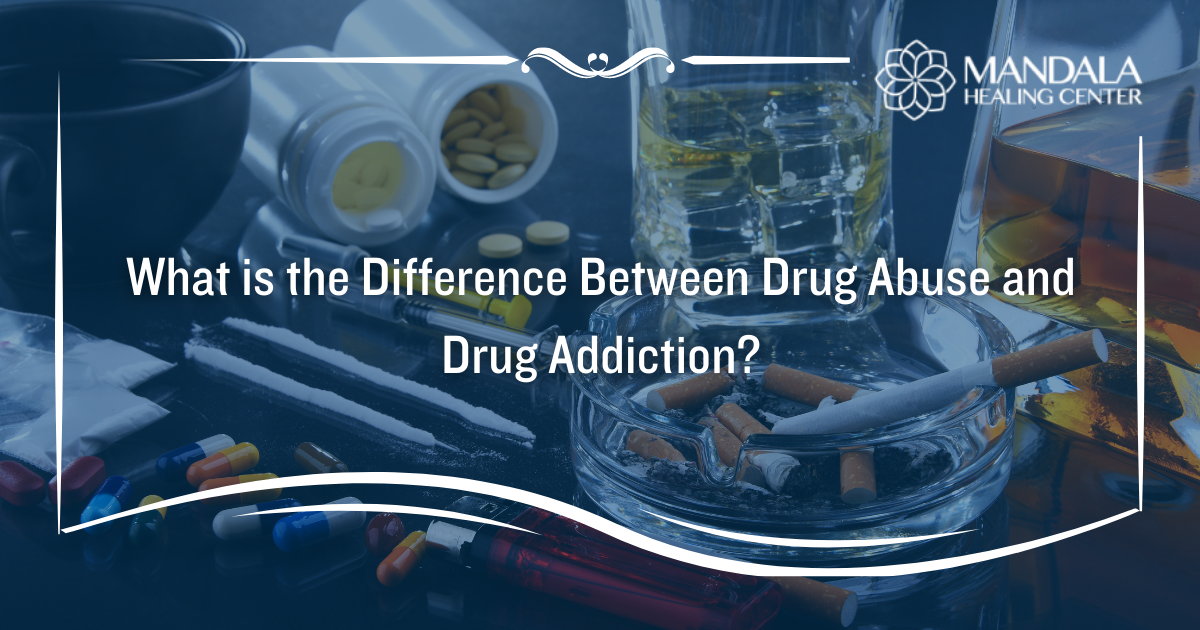Drug use is common across the world. Many people experiment with drug use, either out of curiosity or peer pressure or to self-medicate symptoms of a health condition. Periods of drug abuse may lead to addiction, which often requires professional treatment to overcome.
Although many use the terms “drug abuse” and “addiction” interchangeably, they do not mean the same thing. Understanding the signs of drug abuse and addiction may help determine when you or someone you love requires treatment.
Many mental health and addiction specialists use specific criteria to diagnose people with a substance use disorder (SUD). Substance use disorders include both drug abuse and addiction. While a professional may group these two conditions, it is essential to understand the signs of drug abuse vs. drug addiction so you can take the proper steps to address it.
Contact the Mandala Healing Center specialists today for more information about starting a substance abuse treatment program.
What is Drug Abuse?
Drug abuse is defined as using prescription, over-the-counter, or illegal drugs in larger doses than intended or for reasons other than prescribed. Some examples of drug abuse include:
- Snorting cocaine at a party
- Taking a larger dose of your prescription pain medication than your doctor prescribed
- Drinking cough syrup recreationally
Many people experiment with drugs or alcohol at some point in their lifetime, but not everyone develops an addiction. But if someone has a period of prolonged or heavy drug abuse, they are more likely to develop dependence or addiction to the drug.
Signs of Drug Abuse
Drug abuse has many physical and behavioral signs that both the drug user and others may notice. Some of the physical signs of drug abuse include:
- Irregular sleep
- Decreased appetite
- Shakiness
- Nausea or vomiting
- Runny nose
- Lethargy or hyperactivity
- Loss of coordination
- Irregular heartbeat
- Red eyes
- Runny nose and eyes
- Pale or flushed skin
The symptoms people experience depend on the drug they abuse. They may also exhibit some common behavioral symptoms, including:
- Poor work or school performance
- Neglecting hygiene
- Irritability, sensitivity, or paranoia
- Lack of motivation
- Secretive behavior or dishonesty
- Isolating from friends and family
- Sudden financial or legal problems
Drug abuse can change a person’s mood, appearance, and behavior. However, not all who abuse drugs develop an addiction.
Do People Need Treatment for Drug Abuse?
Someone who abuses drugs may benefit from the structure and support of a substance abuse treatment plan, especially if they are abusing drugs to try and self-medicate an underlying emotional or psychiatric issue. People who have not developed a drug addiction may not require the same medical intervention and support as those who do. Seeking treatment for drug abuse can prevent the development of addiction later in life.
What is Addiction?
Addiction is different from drug abuse because people suffering from addiction exhibit obsessive and compulsive behaviors regarding their drug use. When someone is addicted to drugs, their body and brain have changed to accommodate the presence of the drugs, and they cannot function without them. Someone who is addicted to drugs is unable to stop using on their own and will almost always require professional treatment.
If someone with drug addiction attempts to stop using drugs without help, they will likely suffer uncomfortable or dangerous withdrawal symptoms. Often, these symptoms, which can include cravings, nausea, shakiness, hallucinations, and seizures, are so debilitating that people begin to use drugs again.
Signs of Addiction
The most significant symptom of addiction is tolerance. A person who regularly abuses a drug may develop tolerance to it, meaning they need to ingest more of it to get the same effects. Tolerance is a sign that a person’s body and brain require the drug to function–that they are developing a physical dependence on it.
Other signs of drug addiction include:
- Tremors
- Lack of physical coordination
- Weight gain or loss
- Poor sleep
- Skin changes
- Constricted pupils
Addiction is a serious and complex condition that requires comprehensive treatment, including medically-supervised detox. People must receive the support they need to detox from the drug and learn coping skills to avoid relapses in the future.
Addiction treatment programs use a combination of evidence-based and holistic therapies, including therapy, medications, and education, to help people overcome addiction and live healthy, sober lives.
How to Determine Drug Abuse vs. Drug Addiction
Not everyone who uses drugs will develop an addiction to them, but it’s important to recognize when someone is living with addiction and get the support and treatment they need.
Drug abuse means using drugs differently than prescribed or in larger amounts than recommended. Over time, a person who abuses drugs may develop a physical dependence on them. Quitting is nearly impossible and usually requires significant interventions, support, and treatment.
If you are considering if someone has drug abuse vs. drug addiction, keep in mind the four Cs of addiction:
- Loss of Control over drug use.
- Compulsive drug use.
- Drug Cravings.
- Continuing to use drugs despite the negative consequences.
Someone who feels powerless over their drug use, continues to use drugs while their life unravels, and experiences strong urges to use drugs may meet the criteria for drug addiction. It’s essential to seek comprehensive treatment that will provide the skills they need to address addiction’s physical, behavioral, and emotional aspects.
Get Help Now
If you or someone you love requires substance abuse treatment or support during recovery, reach out today to the Mandala Healing Center staff today.












